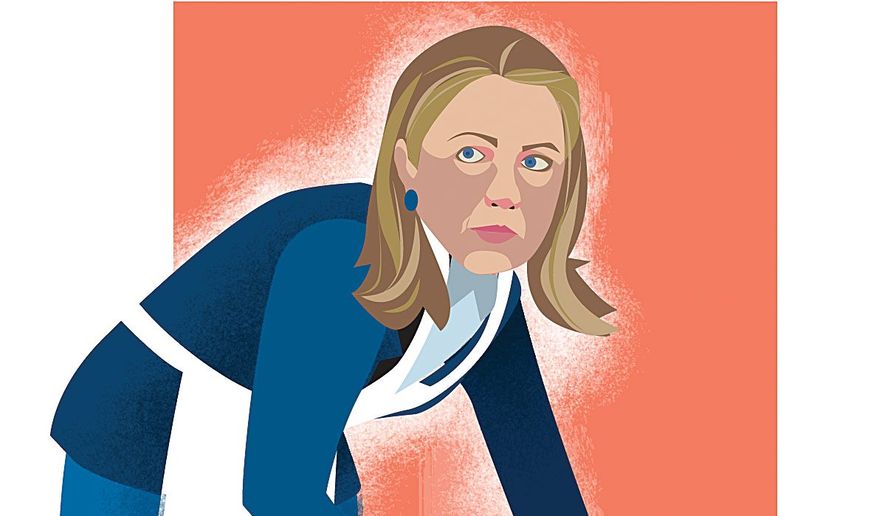OPINION:
It is hard to imagine the 2016 presidential race without Hillary Clinton.
But Mrs. Clinton seems to have missed the most important lesson that everyone else learned from the Watergate scandal: The cover up is worse than the crime.
It is especially ironic since Mrs. Clinton started her legal career in Washington advising the House Judiciary Committee during the Watergate investigation.
Viewing Mrs. Clinton’s political career through a historical lens, one might think she learned more from the Watergate suspects her committee investigated than from the congressional lawyers she worked for.
Mrs. Clinton’s Nixonian approach to politics surfaced in 1993 when her college thesis on radical community organizer Saul Alinsky arose as a source of controversy. Conservatives hoped the paper would reveal the new first lady’s radical leftist views, and instead of releasing the paper, the White House suppressed it.
The paper actually revealed less than Mrs. Clinton’s opponents hoped for, and upon its publication, her former professor Alan Schecter told MSNBC that suppressing the thesis, “was a stupid political decision, obviously at the time.”
That same year when Vince Foster died, Mrs. Clinton only fueled the fire of speculation that his death was a political assassination. A Secret Service agent testified in 1995 that the first lady directed the unlawful removal of records related to the Whitewater Development Corp. from Mr. Foster’s office.
In 1996, New York Times columnist William Safire branded Mrs. Clinton “a congenital liar.”
When the Monica Lewinsky scandal surfaced in 1997, Mrs. Clinton insisted she did not know about the affair until afterward. In 1998, she flatly told “The Today Show,” “There isn’t any fire,” to the Lewinsky allegations. But subsequent reports indicate it was Mrs. Clinton’s former assistant Evelyn Lieberman who orchestrated Miss Lewinsky’s removal from the White House.
In 2000, when Mrs. Clinton was confronted by Tim Russert during a New York Senate race debate about the affair, she still insisted she hadn’t deceived the country.
“Obviously, I didn’t mislead anyone,” she insisted. “I didn’t know the truth.”
Mrs. Clinton could not have known that she would become the target of a congressional investigation over her role in the Benghazi tragedy. Still, her decision to use a private email server shows that she prophetically presumed she would have something to hide.
Some media have suggested that since the Federal Records Act was not amended to prohibit government officials from using of private emails until last year, Mrs. Clinton was not in violation. But since 1950, the act has required that federal employees preserve records that contain “informational value” or that document “the transaction of public business” and “the organization, functions, policies, decisions, procedures, operations or other activities of the government.”
Under those broad definitions, the 55,000 pages of emails that Mrs. Clinton is now volunteering to release should have been preserved by the government all along. Even at the time Mrs. Clinton left her State Department position in 2013, the law dictated her emails should have been turned over to the National Archives and Records Administration (NARA).
“Since 2009, NARA’s regulations have stated that ’Agencies that allow employees to send and receive official electronic mail messages using a system not operated by the agency must ensure that Federal records sent or received on such systems are preserved in the appropriate agency record keeping system [under 36 CFR 1236.22],’” according to a statement from the National Archives and Records Administration.
“The Federal Records Act requires that an agency head preserves a record. It also requires that if records were unlawfully removed, defaced or destroyed that the agency head notify the archivist at the National Archives. In this case, Mrs. Clinton should have notified the head archivist that she had in her possession, official agency records,” said Daniel Epstein, executive director of Washington transparency group Cause of Action.
Mrs. Clinton may have also been in violation of national security laws if any of her emails contained classified information.
Under 18 U.S. Code, Section 1924, “Whoever, being an officer of the United States, and, by virtue of his office becomes possessed of documents or materials containing classified information of the United States, knowingly removes such documents or materials without authority and with the intent to retain such documents or materials at an unauthorized location shall be fined under this title or imprisoned for not more than one year, or both.”
Since Mrs. Clinton retained exclusive control over her emails throughout her tenure, that exclusive control could potentially qualify as “removal.”
Mrs. Clinton risked all of this because, like President Nixon, she wanted to retain absolute control over the media’s narrative about her. But actions have consequences, and for Mrs. Clinton her desire to control public perception has cost her many of her own Democratic allies.
Hillary Clinton may finally learn the lessons of Watergate from her own “Servergate,” but it may be a lesson that was learned far too late.
• Jeffrey Scott Shapiro is a former Washington, D.C. prosecutor who now writes for The Washington Times.




Please read our comment policy before commenting.